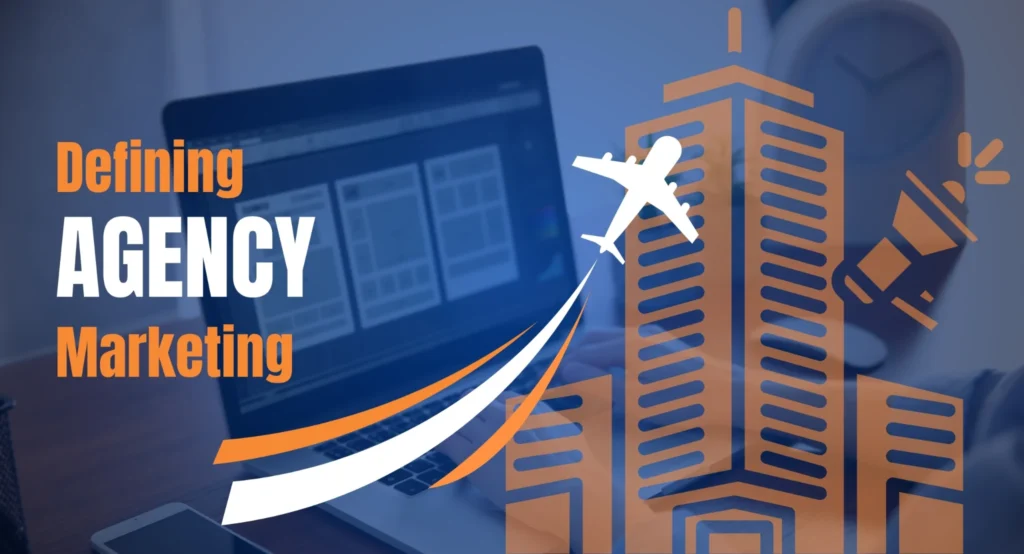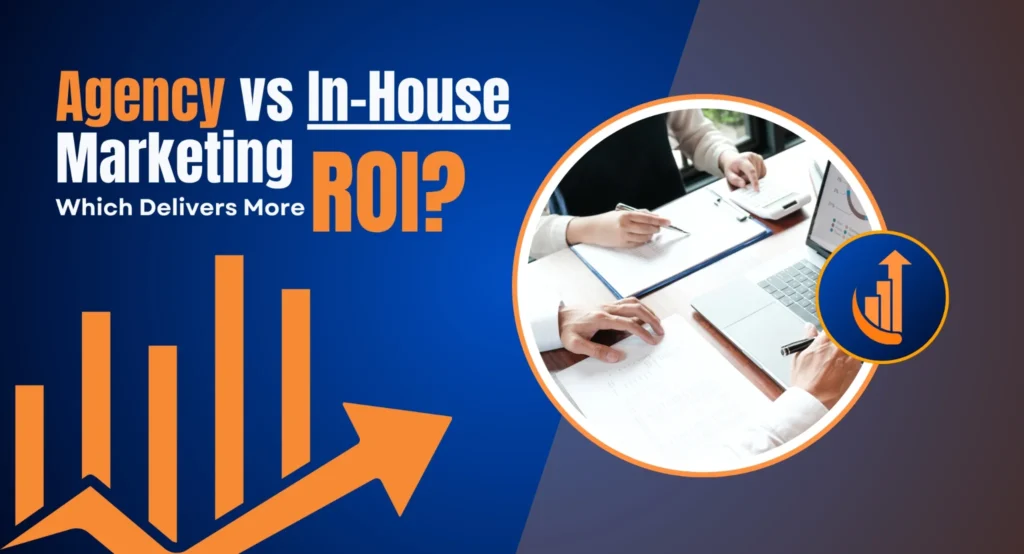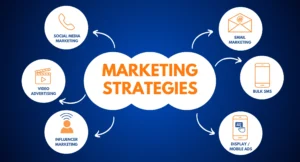Introduction: The Modern Marketing Dilemma
Every business today understands that marketing is no longer optional — it’s the engine that drives visibility, leads, and long-term growth. But the real question many owners face is whether to build an in-house marketing team or hire a digital marketing agency. This debate — agency vs in-house marketing — has become one of the most important business decisions in 2025, especially for small to medium-sized businesses and contractors who need every dollar spent on marketing to deliver strong ROI.
For construction companies, service providers, and local businesses, marketing can make the difference between being the first choice in your area or being invisible to potential customers. With digital platforms becoming more competitive and advertising costs increasing, the way you structure your marketing investment matters as much as the budget itself.
Why ROI Is at the Center of the Debate
The ultimate goal of marketing isn’t just exposure — it’s return on investment (ROI). Whether you choose to go in-house or work with an agency, you want measurable outcomes: more leads, more clients, and more revenue.
- In-house marketing teams promise control and alignment with company culture.
- Agencies promise specialized expertise, flexibility, and cost-efficiency.
The real challenge? Deciding which option delivers more ROI for your business. This guide explores the pros and cons of both models so you can make an informed decision.
Why This Matters for Contractors and Service Businesses
The agency vs in-house marketing debate isn’t just for large corporations. In fact, it’s even more critical for contractors, remodelers, and service-based businesses because:
- Budgets are tighter, so wasted spend has bigger consequences.
- Every lead has high value (a single job can be worth thousands).
- Marketing must adapt quickly to local competition and changing trends.
For example, a roofing contractor running ads during storm season needs campaigns set up quickly and effectively. An agency might provide the speed and expertise needed, while an in-house team may offer closer alignment to company operations. Both approaches can work — the key is understanding which one fits your goals and resources.
The Growing Complexity of Marketing in 2025
Another reason this debate is so relevant today is the complexity of modern marketing. Ten years ago, a business could get by with a simple website and a few newspaper ads. Today, you need:
- SEO to rank in Google searches.
- Paid ads on platforms like Facebook, Instagram, and TikTok.
- Content marketing and blogs for authority.
- Email campaigns and automation for nurturing leads.
- Analytics tools to measure performance.
Expecting one or two people in-house to master all these areas can be unrealistic. That’s why many businesses consider the agency vs in-house marketing choice less about control and more about access to the right skill sets.
What This Guide Will Cover
In this blog, we’ll break down the agency vs in-house marketing decision by examining:
- The strengths and weaknesses of in-house marketing teams.
- What agencies bring to the table.
- Cost comparisons and ROI implications.
- Scalability, expertise, and flexibility considerations.
- Real-world case studies showing when each option works best.
By the end, you’ll have a clear framework to decide which model — agency or in-house marketing — can deliver the highest ROI for your business.
Defining In-House Marketing
What Is In-House Marketing?
In-house marketing means building and managing a dedicated marketing team within your company. Instead of outsourcing campaigns to an agency, you hire employees who work exclusively for your business. This may include roles such as:
- Marketing manager or coordinator.
- Social media specialist.
- SEO or content writer.
- Designer or web developer.
For larger businesses, an in-house team can resemble a full department. For smaller companies, it may be one or two people handling multiple tasks.
In the agency vs in-house marketing debate, in-house teams appeal to businesses seeking full control and alignment with their brand voice.
Strengths of In-House Marketing
- Full Control and Alignment
With an in-house marketing team, you have complete oversight of campaigns. Strategies, brand messaging, and timelines are fully aligned with your company culture and goals. This level of control can be reassuring for businesses that want close collaboration. - Deep Knowledge of the Brand
Internal teams live and breathe the company every day. They know your products, services, and values inside out, which can lead to authentic and consistent messaging. - Direct Communication
Working with an in-house team removes layers of communication. Instead of scheduling agency calls, you can walk down the hall (or message your in-house marketer) and get immediate updates. - Faster Adaptation to Internal Needs
If priorities shift suddenly — for example, a contractor wants to promote seasonal services like roof inspections after a storm — an in-house team can pivot instantly.
Weaknesses of In-House Marketing
- High Costs
One of the biggest drawbacks in the agency vs in-house marketing debate is cost. Hiring even a small marketing team can be expensive once you add salaries, benefits, training, and software subscriptions. For example:- Marketing Manager: $65,000–$90,000/year.
- Designer: $50,000–$70,000/year.
- Social Media Specialist: $40,000–$60,000/year.
Together, this can exceed the cost of working with a full-service agency.
- Limited Skill Sets
Marketing today requires a wide range of expertise: SEO, PPC, social media, web design, content writing, analytics, and more. An in-house team may struggle to cover all these areas effectively, especially if it’s small. - Scaling Challenges
When business grows, scaling an in-house team means hiring more staff — a process that takes time and money. Agencies can scale services faster without requiring you to expand headcount. - Risk of Burnout
Small in-house teams often juggle multiple responsibilities. One marketer might be running ads, managing social media, writing blogs, and updating the website all at once. This can lead to fatigue, lower performance, and turnover.
Example: In-House Marketing for a Contractor
Consider a mid-sized remodeling company that hires a full-time marketing coordinator to manage social media, ads, and website updates. Initially, results improve because campaigns align closely with the company’s voice. But after six months, the coordinator struggles to manage all platforms, ad campaigns become inconsistent, and the business considers hiring additional staff.
In this scenario, while the in-house approach provides alignment and control, the lack of diverse expertise limits ROI compared to an agency team with specialists in each area.
The Bottom Line on In-House Marketing
In the agency vs in-house marketing comparison, in-house marketing offers strong brand alignment, faster communication, and tighter control. However, it comes with high costs, limited skill sets, and scalability issues. For businesses with large budgets and long-term growth plans, in-house may work. But for smaller companies or contractors looking for maximum ROI on a lean budget, the limitations often outweigh the benefits.
Defining Agency Marketing
What Is Agency Marketing?
In the ongoing agency vs in-house marketing discussion, agencies represent the outsourcing option. Instead of hiring employees directly, businesses partner with a digital marketing agency that provides a full team of specialists. These agencies handle services such as:
- SEO and content creation.
- Paid ads management (Google Ads, Facebook, Instagram).
- Social media campaigns.
- Web design and development.
- Analytics and reporting.
This model gives businesses access to diverse expertise without the cost of building a full internal department.
Strengths of Agency Marketing
- Specialized Expertise
Agencies employ experts across multiple fields. A contractor working with an agency doesn’t just get one marketer — they get SEO specialists, ad managers, designers, and content writers. In the agency vs in-house marketing debate, this depth of expertise often makes agencies more cost-effective for smaller businesses. - Scalability and Flexibility
Need to increase ad spend during peak season? Or pause campaigns in slower months? Agencies can scale services up or down quickly. In contrast, scaling in-house requires new hires or restructuring. - Access to Advanced Tools
Agencies often have subscriptions to premium marketing tools (SEMrush, Ahrefs, HubSpot, advanced analytics dashboards) that would be expensive for individual businesses to purchase. - Lower Overhead Costs
While agency retainers may seem high, they usually cost less than maintaining a full in-house team. For example, a $3,000/month retainer provides a full suite of services, compared to $10,000+ in salaries for an internal team.
Weaknesses of Agency Marketing
- Less Day-to-Day Control
In agency vs in-house marketing, the main drawback of agencies is reduced control. Since they work with multiple clients, they may not be able to pivot instantly without notice. - Communication Gaps
Agencies may not always be fully aligned with your internal company culture. Sometimes, extra effort is needed to ensure messaging matches your brand voice. - Potential for Generic Approaches
Some agencies rely on templated strategies. If you choose the wrong partner, campaigns may lack personalization.
Example: Agency Marketing for a Contractor
Imagine a window and door installation company looking to boost leads. Instead of hiring three employees in-house, they partner with an agency. The agency sets up SEO-optimized service pages, manages Facebook ads, and runs Google Ads targeting local homeowners. Within three months, the company sees a 35% increase in leads at a cost that’s half of what building an in-house team would require.
This demonstrates why, in the agency vs in-house marketing debate, agencies often deliver higher ROI for smaller service-based businesses.

When Agencies Make the Most Sense
Agencies work best for:
- Small to mid-sized businesses that don’t have the budget for full internal teams.
- Contractors and local businesses needing diverse marketing services (SEO, ads, design).
- Companies focused on ROI that want measurable results without heavy overhead.
If your business values flexibility, scalability, and access to specialists, agencies often outperform internal teams.
The Bottom Line on Agency Marketing
In the agency vs in-house marketing comparison, agencies excel at providing broad expertise, scalability, and cost efficiency. While they may lack the deep brand alignment of internal teams, they often deliver stronger ROI for contractors and service providers who can’t afford to hire full departments. For many businesses, partnering with an agency is the smartest path to achieving growth.
Cost Comparison: Agency vs In-House Marketing
Why Cost Is Central to the Debate
When businesses weigh agency vs in-house marketing, cost is usually the first concern. While both approaches require investment, the way budgets are allocated and the ROI they generate are very different. Understanding these cost structures helps businesses decide which option offers the best value for money.
The Cost of In-House Marketing
Building an internal team requires more than just paying salaries. Employers must also account for benefits, training, software, and overhead. A typical small marketing team may include:
- Marketing Manager: $70,000–$90,000/year
- Social Media Specialist: $45,000–$60,000/year
- Designer/Content Creator: $50,000–$70,000/year
- SEO or PPC Specialist: $60,000–$80,000/year
That’s easily $250,000+ annually, not including software like SEMrush, HubSpot, or ad spend. For contractors or local service businesses with limited budgets, this cost often outweighs potential benefits.
Hidden costs of in-house marketing:
- Recruitment fees and time to hire.
- Training and skill development.
- Employee turnover, which disrupts campaigns.
The Cost of Agency Marketing
Agencies typically charge a monthly retainer or project-based fee. For example:
- Small to mid-sized agency retainers: $2,000–$5,000/month.
- Full-service agencies: $6,000–$15,000/month.
- Project-based campaigns (like a website redesign): $5,000–$20,000 one-time.
That means even at $5,000/month, you’re looking at $60,000 annually for a full team of specialists — a fraction of the cost of in-house.
Additional advantages:
- No payroll, benefits, or HR overhead.
- Access to a wider range of skills at one fixed fee.
- Ability to scale services up or down as needed.
ROI Considerations: Agency vs In-House Marketing
Cost alone doesn’t tell the full story — ROI is what really matters.
- In-house ROI potential: Strong alignment with brand voice and direct collaboration, but often limited by smaller teams and skill gaps. ROI can be high if the team is talented and the company can afford multiple roles.
- Agency ROI potential: Broader expertise and scalability at lower costs. Agencies often deliver better short-term ROI because they can launch campaigns faster and cover more channels without additional hires.
Example: ROI Comparison for a Contractor
- A remodeling company hires an in-house team of 3 marketers at $180,000/year total cost. They generate 250 leads, with 50 turning into projects worth $500,000 in revenue. ROI: 2.8X.
- Another contractor partners with an agency for $5,000/month ($60,000/year). The agency runs SEO, ads, and social media, generating 400 leads, with 80 projects worth $800,000 in revenue. ROI: 13X.
This example highlights why, in many agency vs in-house marketing comparisons, agencies often deliver stronger ROI for small to mid-sized businesses.
Which Model Fits Different Budgets?
- Small businesses/contractors: Agencies are usually more cost-efficient, providing access to specialists without heavy overhead.
- Mid-sized companies: A hybrid model (one in-house coordinator + agency support) may balance cost and control.
- Large enterprises: In-house teams may make sense due to larger budgets and the need for tighter brand alignment.
The Bottom Line
When it comes to agency vs in-house marketing, in-house teams are significantly more expensive due to salaries, benefits, and hidden costs. Agencies, on the other hand, provide full teams of experts at a fraction of the price. For most small to mid-sized businesses, agencies deliver higher ROI by combining cost efficiency with expertise.
Expertise and Specialization
Why Expertise Shapes ROI
When businesses evaluate agency vs in-house marketing, expertise is often the deciding factor. Marketing today is no longer a single skill — it’s a mix of SEO, PPC, social media, email campaigns, analytics, design, and content strategy. The depth and breadth of expertise available directly impact how much ROI a company can generate from its marketing efforts.
The Skill Set of In-House Teams
An in-house marketing team usually consists of a few employees covering multiple responsibilities. For smaller businesses, one or two marketers may be expected to “wear many hats”:
- Running social media campaigns.
- Managing Google Ads or Facebook Ads.
- Writing blogs and newsletters.
- Updating the company website.
Limitations of this model:
- Skill gaps are inevitable — one person can’t master every area of digital marketing.
- Campaigns may be inconsistent due to overload.
- Specialized strategies (like advanced SEO or retargeting ads) are often left out.
In the agency vs in-house marketing comparison, in-house teams may deliver strong brand alignment but often lack the depth of expertise needed to compete at scale.
The Skill Set of Agencies
Agencies, by design, are built on specialization. When you hire a digital marketing agency, you’re not just hiring one person — you’re tapping into a team of experts. This typically includes:
- SEO specialists.
- Paid ad managers.
- Content writers.
- Graphic designers and video editors.
- Web developers.
- Analytics professionals.
Each professional focuses on their area, bringing deeper expertise to every campaign.
Advantages of this model:
- Access to advanced strategies (conversion optimization, A/B testing, technical SEO).
- More creativity from a diverse team.
- Ability to launch multi-channel campaigns quickly.
This is why, in many agency vs in-house marketing debates, agencies outperform smaller internal teams when it comes to producing measurable results.
How Expertise Impacts ROI
Let’s compare two scenarios:
- In-house team: A single marketer runs ads, manages the website, and writes blogs. Because they are stretched thin, ad campaigns are not fully optimized, costing more per lead.
- Agency team: A dedicated ad specialist manages PPC campaigns, while an SEO expert improves organic rankings and a designer creates ad visuals. Each task is handled by someone with years of experience, leading to higher conversions and lower costs.
This difference in specialization often results in agencies delivering stronger ROI.
Hybrid Approaches to Expertise
Some businesses take a hybrid approach in the agency vs in-house marketing debate. For example, they may keep a marketing coordinator in-house to handle brand alignment and daily communication while outsourcing specialized tasks like SEO, paid ads, or video production to agencies. This model combines control with expertise, often producing balanced results.
Example: Specialization in Action
A painting company hires one in-house marketer to handle social media and email. The marketer struggles to run Google Ads effectively, wasting $1,000/month on low-converting keywords. After partnering with an agency, a paid ads specialist restructures the campaigns, reducing cost per lead by 40% and doubling conversions.
This example shows how access to specialists can dramatically shift ROI in the agency vs in-house marketing comparison.
The Bottom Line
In the debate of agency vs in-house marketing, expertise is often the biggest advantage agencies bring. While in-house teams may offer strong brand knowledge, they rarely match the depth and specialization of an agency team. For businesses where ROI matters most — especially contractors and service providers — tapping into agency expertise can mean faster results, lower costs per lead, and stronger long-term growth.
Scalability and Flexibility
Why Scalability Matters in the Agency vs In-House Marketing Debate
Marketing needs aren’t static. A contractor may need heavy ad campaigns during peak season and lighter efforts in slower months. A growing business may want to expand from local SEO to regional paid ads. This constant change makes scalability and flexibility crucial. The question is: which option — agency vs in-house marketing — can adapt more effectively to shifting demands while delivering strong ROI?
The Scalability of In-House Marketing
An in-house marketing team has fixed capacity. If you employ one or two marketers, their time and skill sets limit what can be done. Scaling often requires:
- Hiring new staff.
- Training existing employees in new skills.
- Investing in new tools or platforms.
This process takes time and adds significant costs. For example, if a contractor wants to start running YouTube ads but has no video expertise in-house, they’ll either need to hire a videographer or outsource the project anyway.
Weaknesses of in-house scalability:
- Hiring delays stall campaigns.
- Costs grow rapidly as the team expands.
- Existing employees can become overworked if asked to “scale” without additional help.
The Scalability of Agency Marketing
Agencies, on the other hand, are built for scalability. When you work with an agency, increasing efforts is often as simple as raising the budget or adjusting the service package. Agencies already have teams of specialists who can handle new channels, bigger campaigns, or advanced strategies without requiring you to expand your payroll.
Strengths of agency scalability:
- Ability to launch new campaigns quickly.
- Flexible service packages (pause, increase, or shift focus easily).
- Access to specialists across multiple areas without new hires.
In the agency vs in-house marketing comparison, agencies clearly hold an advantage when businesses need fast, cost-effective scalability.
Flexibility in Adapting to Market Changes
Beyond scalability, flexibility is about how quickly marketing strategies can adapt to sudden changes. For example:
- A roofing company may need to pivot campaigns immediately after a hailstorm.
- A remodeling contractor may want to promote seasonal offers in spring or summer.
- A service business may need to pause campaigns during slower months.
In-house marketing:
- Changes may be delayed if staff are already overburdened or lack the expertise.
- Strategic pivots require retraining or hiring outside support.
Agency marketing:
- Agencies can pivot quickly by reallocating resources.
- Teams are experienced in responding to changing market conditions.
- Strategies are informed by broader industry trends, giving agencies an edge.
Example: Scalability in Action
A landscaping company with one in-house marketer tries to expand into TikTok advertising. The employee lacks experience with short-form video ads, and progress stalls for months while training is arranged.
Meanwhile, another landscaping company partners with an agency. Within two weeks, the agency launches TikTok and Instagram Reels campaigns, generating hundreds of views and new inquiries.
This example shows how, in agency vs in-house marketing, agencies often provide the speed and flexibility businesses need to seize opportunities.

Hybrid Flexibility Models
Some businesses blend both approaches. They keep a marketing manager in-house to handle brand voice and internal communication, while agencies handle specialized, scalable services like SEO, PPC, or video campaigns. This hybrid model can provide both control and flexibility, making it a popular choice.
The Bottom Line
In the agency vs in-house marketing debate, scalability and flexibility are where agencies shine brightest. In-house teams are often limited by fixed capacity and high costs when expanding, while agencies can scale services up or down with ease. For businesses in fast-moving industries like construction and contracting, this flexibility can mean the difference between capturing market opportunities or missing them entirely.
Case Studies & ROI Examples
Why Real-World Comparisons Matter
It’s one thing to debate theory, but ROI becomes much clearer when you look at real-world outcomes. The agency vs in-house marketing decision isn’t black and white — it depends on industry, budget, and goals. By comparing examples from both sides, businesses can see how ROI plays out in practical situations.
Case Study 1: In-House Marketing Success
A large home improvement brand decided to go fully in-house. They built a marketing department of 10 employees, including SEO, social media, PPC, and content specialists.
- Investment: $800,000 annually in salaries, benefits, and tools.
- Results: Consistent brand voice, tight internal control, and streamlined communication with sales teams.
- ROI: For every $1 spent, they earned $4 back — strong results, but only possible because of their large budget.
This shows that in the agency vs in-house marketing comparison, in-house works best when budgets are high enough to hire full teams of experts.
Case Study 2: Agency Marketing for a Contractor
A roofing contractor needed quick results after storm season. They didn’t have time to build an in-house team, so they hired an agency.
- Investment: $4,000/month retainer ($48,000 annually).
- Agency Actions: Ran Facebook ads, optimized Google Business Profile, created SEO landing pages.
- Results: 320 new leads in six months, with 60 closing into jobs worth $500,000.
- ROI: For every $1 spent, $10 came back.
Here, the agency vs in-house marketing decision clearly favored the agency. At a fraction of the cost, they delivered scalable ROI without overhead.
Case Study 3: Hybrid Approach
A remodeling company used a hybrid model in the agency vs in-house marketing debate. They hired a marketing coordinator to manage social media and in-house updates, but outsourced SEO and PPC to an agency.
- Investment: $55,000/year salary + $3,000/month agency = ~$91,000 annually.
- Results: 200+ qualified leads annually, strong alignment with brand voice, and consistent campaign performance.
- ROI: Balanced — more control than full agency outsourcing, but still benefiting from agency expertise.
The hybrid model is a growing trend for businesses caught in the middle of the agency vs in-house marketing choice.
Case Study 4: In-House Challenges
A mid-sized contractor decided to rely solely on an in-house marketing manager. The employee handled ads, SEO, social media, and website updates.
- Investment: $65,000/year.
- Challenges: Overworked marketer, inconsistent campaigns, lack of advanced skills for PPC.
- Results: Only 80 leads generated in one year.
- ROI: For every $1 spent, only $1.50 returned.
This shows that while cheaper upfront, in-house solutions can struggle when a single person carries too many responsibilities. In the agency vs in-house marketing debate, this scenario demonstrates why agencies often outperform internal generalists.
Comparing ROI Across Models
- Full In-House: High ROI for large businesses with big budgets and teams.
- Agency Marketing: Strong ROI for small to mid-sized businesses needing expertise across multiple channels.
- Hybrid: Balanced ROI for companies that want both control and external expertise.
The Bottom Line
When evaluating agency vs in-house marketing, the case studies reveal a clear pattern:
- Large enterprises can justify in-house because they can afford full departments.
- Small and mid-sized businesses see stronger ROI with agencies because of cost efficiency and expertise.
- Hybrid models can strike a balance but still rely heavily on agency support for specialized areas.
Ultimately, the agency vs in-house marketing debate comes down to ROI. For most contractors and service-based businesses, agencies deliver faster, more measurable results at lower costs. For larger enterprises, in-house teams can work — but only with substantial investments.
Which Is Right for Your Business?
Why the Decision Matters
The agency vs in-house marketing debate isn’t just an academic conversation. For contractors, service providers, and growing businesses, this choice directly affects ROI, lead generation, and long-term growth. The wrong decision can waste precious budget, while the right one can create a sustainable marketing engine that fuels success for years.
When In-House Marketing Makes Sense
Choosing in-house can be the right option if:
- You have a large budget. A full marketing department with specialists is expensive but effective.
- Brand control is a priority. If your campaigns must reflect very specific cultural or brand nuances, in-house may help.
- You need constant internal collaboration. Businesses where marketing and operations overlap daily may benefit from direct communication.
Example: A national construction supply chain with a $1M+ annual marketing budget could justify building a full internal team. In the agency vs in-house marketing framework, in-house wins here because resources are available to cover skill gaps.
When Agencies Deliver More ROI
For small and mid-sized businesses, agencies often outperform in-house marketing because:
- They offer diverse expertise. Instead of one marketer juggling everything, agencies provide teams of SEO experts, ad managers, designers, and writers.
- They cost less. Agencies provide access to specialists at a fraction of in-house salaries.
- They scale easily. Need to increase ad spend or launch a new campaign? Agencies can adjust faster than internal teams.
Example: A roofing company with a $50,000 annual marketing budget partners with an agency. Instead of hiring one full-time marketer, they get a full team, resulting in higher ROI. In the agency vs in-house marketing comparison, this scenario almost always favors agencies.
Hybrid Models: The Best of Both Worlds
Many businesses don’t choose one or the other — they combine both. In the agency vs in-house marketing decision, a hybrid model can balance control and expertise.
- In-house marketer: Maintains brand voice, manages internal communications.
- Agency: Provides advanced skills in SEO, PPC, web design, and analytics.
This approach is common in industries like construction, where marketing coordinators understand local markets but still need agency-level support for scaling campaigns.
Decision Framework: How to Choose
Ask yourself the following questions when weighing agency vs in-house marketing:
- What is my budget? If it’s under $200,000 annually, agencies usually provide more value.
- Do I need diverse expertise? Agencies win here unless you can afford multiple hires.
- How fast do I need results? Agencies can launch campaigns in weeks; in-house may take months to hire and train.
- Is brand alignment critical? In-house teams may be better for highly sensitive industries.
- Am I ready to manage employees? Agencies remove HR burdens, while in-house requires more oversight.
The Contractor’s Perspective
For contractors, remodelers, and local service providers, the agency vs in-house marketing debate often comes down to ROI. A single lead may be worth thousands, which means effective campaigns pay for themselves. Most contractors don’t have the budget to hire multiple in-house experts. Agencies, therefore, provide the best balance of affordability, expertise, and scalability.
The Bottom Line
The agency vs in-house marketing decision depends on your budget, goals, and growth stage. Large enterprises may benefit from in-house teams, but small to mid-sized businesses almost always achieve stronger ROI with agencies. For many companies, hybrid models can deliver the best of both worlds.
Ultimately, the smartest choice is the one that aligns with your financial capacity, need for expertise, and long-term vision. For most contractors and service providers, partnering with an agency unlocks faster growth at lower costs.
Conclusion: Agency vs In-House Marketing and ROI
Why the Debate Matters More Than Ever
In today’s digital-first business environment, the agency vs in-house marketing decision is one of the most important choices a company can make. Whether you’re a contractor trying to generate steady leads, or a growing service business expanding into new markets, the way you structure marketing directly impacts ROI. The wrong decision can waste time and money, but the right choice can set up long-term growth.
What the Comparisons Show
Throughout this guide, we’ve explored how agency vs in-house marketing plays out in cost, expertise, scalability, and ROI. The evidence points to clear patterns:
- In-house marketing works well for large enterprises with budgets to hire full teams.
- Agencies deliver stronger ROI for small to mid-sized businesses because they provide diverse expertise at lower costs.
- Hybrid approaches balance control with flexibility, often giving businesses the best of both worlds.
When comparing ROI, case studies consistently show that agencies outperform small in-house teams, especially for contractors, remodelers, and local service providers.
Why Agencies Win for Most Businesses
For most businesses, the agency vs in-house marketing debate isn’t really a debate at all — agencies often win. The reasons are clear:
- Lower costs compared to full-time hires.
- Access to specialists across SEO, PPC, social media, and design.
- Faster scalability when market opportunities arise.
- Proven ROI, especially in industries where every lead is valuable.
Agencies also bring outside perspective, allowing businesses to avoid blind spots and leverage strategies tested across multiple industries.
When In-House Still Makes Sense
That said, the agency vs in-house marketing debate isn’t completely one-sided. In-house can still make sense if:
- You have a budget over $500,000 annually.
- You require tight brand alignment.
- You want daily collaboration between marketing and sales.
For companies at this scale, the investment in an internal team may justify the control and direct communication they gain.
Making the Right Decision for ROI
At the end of the day, the agency vs in-house marketing decision must be based on ROI. Ask yourself:
- Can I afford a full in-house team?
- Do I need specialized skills across multiple channels?
- Am I looking for scalability and flexibility?
For most contractors and SMBs, the answers point to agencies as the smarter investment.
Work With Rynox Digital
At Rynox Digital, we’ve seen firsthand how the agency vs in-house marketing decision affects growth. Our clients — contractors, service businesses, and local brands — often come to us after struggling with limited in-house resources. By providing expert campaigns, SEO strategies, and ad management, we’ve helped them achieve stronger ROI without the high overhead of building internal teams.
Don’t leave your growth to chance. If you’re weighing the agency vs in-house marketing decision, let Rynox Digital show you how an experienced agency can maximize your ROI, generate consistent leads, and give your business the competitive edge it needs.






